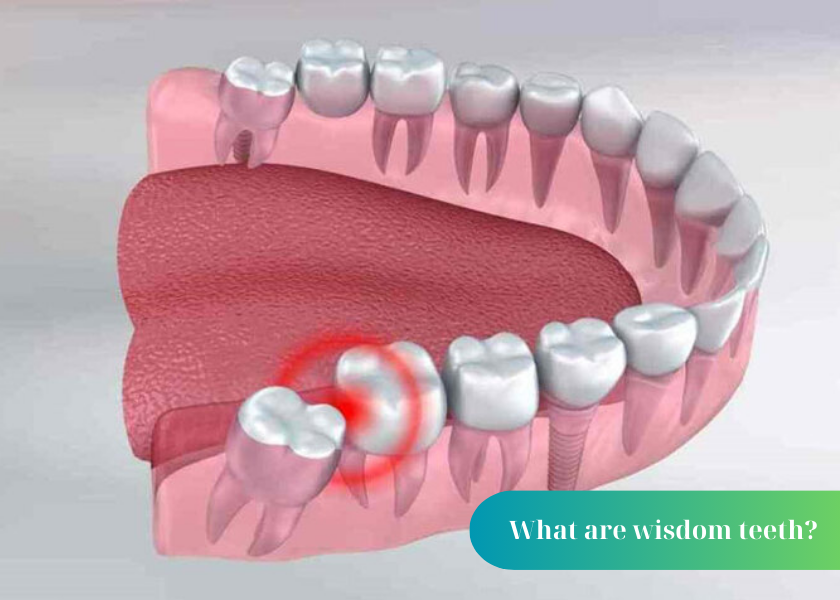What are wisdom teeth? Wisdom teeth grow crooked and impacted, causing pain and discomfort for the patient. Many people believe that wisdom tooth extraction can be dangerous for you. Is this true? How to handle wisdom teeth growing crooked or impacted? To answer these questions, please follow BeamDental’s article!
Tư vấn chuyên môn bài viết:
BÁC SĨ DƯƠNG THỊ THÙY NGA
What are wisdom teeth?
Wisdom teeth, also known as teeth number 8, usually appear between the ages of 17 and 25. In the structure of human molars, wisdom teeth do not play an important role. When wisdom teeth grow in, it will cause you pain and discomfort because the molar structure only has enough room for 28 teeth, including 14 upper molars and 14 lower molars. When you reach adulthood, you will grow 4 more wisdom teeth, including 2 upper teeth and 2 lower teeth. The additional wisdom teeth will compress the neighboring teeth, causing swelling and pain.
Causes of impacted wisdom teeth and complications
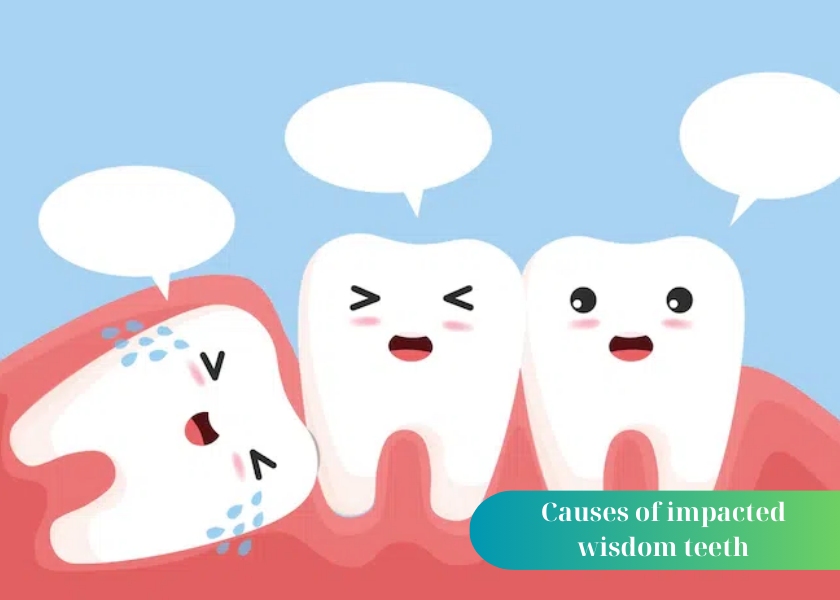
Because wisdom teeth do not have enough room to grow straight like normal teeth, wisdom teeth have to find another direction to grow, leading to the situation of wisdom teeth growing crookedly, growing underground, and growing 90 degrees horizontally.
Wisdom teeth grow crooked
Impacted wisdom teeth are a fairly common condition. When wisdom teeth grow, your jawbone is fixed, no longer growing and the bone structure is also quite strong. Along with that, the soft tissues covering the surface also become thicker, affecting the wisdom tooth growth process. When wisdom teeth do not have enough room to grow straight, wisdom teeth grow crookedly, grow over other teeth, or pierce the cheek. In this case, wisdom teeth often grow at a 45-degree angle, causing swelling and pain in the cheeks.
When wisdom teeth grow at a 45-degree angle, it will damage soft tissue and cause complications:
- Infection: When wisdom teeth grow crookedly, it will create friction with the soft tissues or adjacent teeth, causing inflammation, or more seriously, infection of the gums or soft tissue in your cheeks.
- Shifting the position of molars: The pressure of wisdom teeth when growing will shift the position of neighboring teeth, causing one tooth to push the other tooth, causing the original position of the teeth in the jaw to shift. lose your beauty.
- Damaged tooth number 7: Tooth number 7 is located between tooth number 6 and the wisdom tooth. When the wisdom tooth grows, it will compress tooth number 7, causing the tooth root to weaken, leading to tooth root loss.
Wisdom teeth grow underground
Impacted wisdom teeth are a condition in which the wisdom teeth are located in the jawbone or are covered by the gums, stuck under the gums and cannot emerge. The cause of this condition is also because the jaw does not have enough room for the teeth to emerge. When wisdom teeth grow impacted, it will lead to the following complications:
- Damage to tooth number 7: Just like the condition of impacted wisdom teeth, impacted wisdom teeth also affect tooth number 7, affecting the root of the tooth, causing tooth number 7 to loosen, causing tooth number 7 to be lost.
- Gingivitis: Gingivitis is a fairly common condition when you grow wisdom teeth. However, if this complication is not treated promptly, it will lead to other serious diseases such as periodontitis, pus and spread to other areas such as cheeks, neck…
- Jaw cyst: This is a condition in which wisdom teeth grow underground in the jawbone, affecting the nerves and bone structure.
- Impact on nerves causing reflex and sensory disorders: The location where wisdom teeth grow has many sensory nerves. When wisdom teeth grow underground, they will compress the nerves, causing numbness, loss of sensation or pain. facial area.
Wisdom teeth grow horizontally at 90 degrees
Wisdom teeth growing horizontally at 90 degrees is a condition in which wisdom teeth grow crookedly towards tooth number 7, the chewing surface of tooth number 8 is in contact with tooth number 7. When in such contact, between the chewing surface of tooth number 8 and the crown of tooth number 7 will create crevices, allowing food particles to easily enter. This position will make it difficult for you to clean your teeth, which will lead to complications:
- Tooth decay: When bacteria accumulate inside the contact surface between teeth number 7 and tooth number 8 without thorough cleaning, it will cause tooth decay and affect neighboring teeth.
- Gingivitis: When you have tooth decay, bacteria will accumulate and lead to infection in the surrounding gum area, causing pain, swelling, bad breath… When the pain lasts longer and becomes more serious, you should see a doctor immediately. dentist for complete treatment.
- Destruction of bone and root of tooth number 7: When wisdom teeth grow at a 90-degree angle, it will affect the root of tooth number 7, causing bone loss and loosening of tooth number 7.
See more: How much does porcelain crowns cost? When should porcelain be coated?
Should impacted wisdom teeth be extracted?
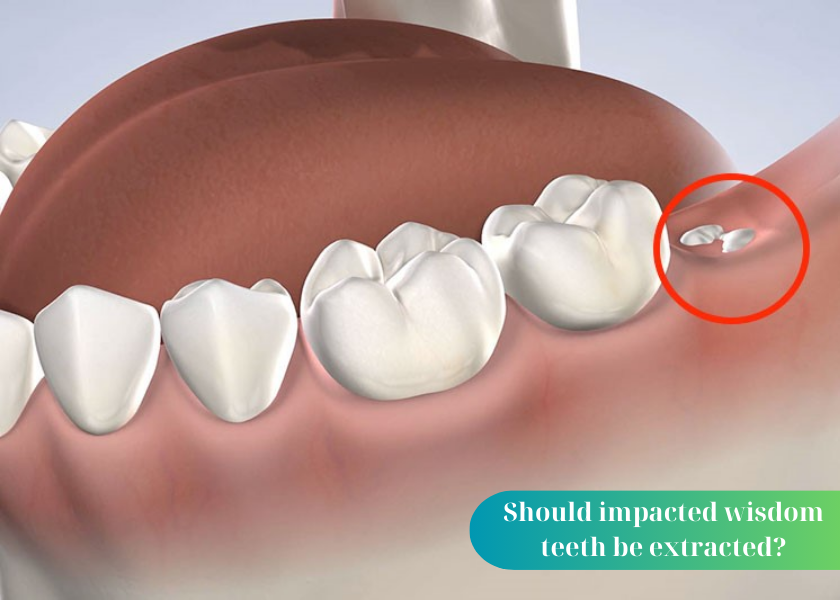
Wisdom teeth grow crooked and impacted, causing discomfort, pain, and swelling, making you worried. Depending on each specific case, the dentist will propose a treatment plan.
Whether or not to remove impacted wisdom teeth is a question that many readers are interested in. Misaligned wisdom teeth lead to complications of tooth infection, tooth damage, changes in tooth position, and pain, so dentists often recommend removing non-misaligned teeth to permanently treat misaligned wisdom teeth and limit complications. this evidence.
Dentists recommend removing wisdom teeth as soon as possible. When teeth are not fully developed, the process of removing misaligned wisdom teeth will be easier. The longer it takes, the more serious the complications will be and the more difficult it will be to remove the tooth.
But if you have heart disease, diabetes or high blood pressure, your dentist will not remove your impacted wisdom teeth without proper instructions. Because the location of wisdom teeth has many nerves, if you have these diseases, removing misaligned wisdom teeth will increase the risk of dental complications. If impacted wisdom teeth cannot be extracted, your doctor will recommend other treatment options to relieve your pain.
See more: How to fix a broken tooth? 3 remedies that you should know
Should horizontal wisdom teeth be extracted?
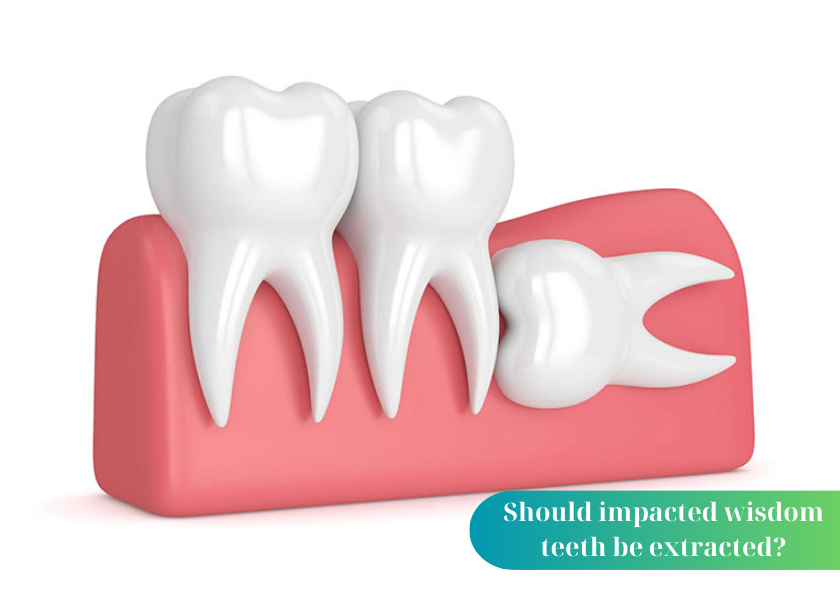
Because wisdom teeth growing at a 90-degree angle and horizontal wisdom teeth are abnormal wisdom teeth that can easily lead to serious complications such as cysts, periodontitis, bone and root loss. However, there are cases where teeth grow underground in the bone without causing complications, so it is not necessary to have them removed immediately.
Normally, impacted wisdom teeth must be removed due to the possibility of forming cysts around the tooth root and causing damage to the jawbone. However, this is not the case in all cases. If it is not necessary to remove it, you can still keep the wisdom tooth that has grown. To ensure there are no complications, you can go to the dentist for regular checkups. The dentist will let you know whether your wisdom teeth need to be extracted or not.
Is removing crooked or horizontal wisdom teeth painful and dangerous?
In fact, the process of removing crooked or horizontal wisdom teeth is just a simple minor surgery, painless and not dangerous if you choose the right reputable dental facility with a team of professional dentists and equipment. modern hook. This plays a very important role in your service experience.
If you choose an unreliable dental facility, it will put you at risk during wisdom tooth extraction surgery and leave serious complications. As you know, there are many nerves at the wisdom tooth extraction site. If the wisdom tooth extraction process damages these nerves, it will be very dangerous. Therefore, before deciding to remove wisdom teeth, you should research and choose a reputable dental facility.
See more: Where to get dental implants in HCMC?
Painless technique for removing horizontal and crooked wisdom teeth
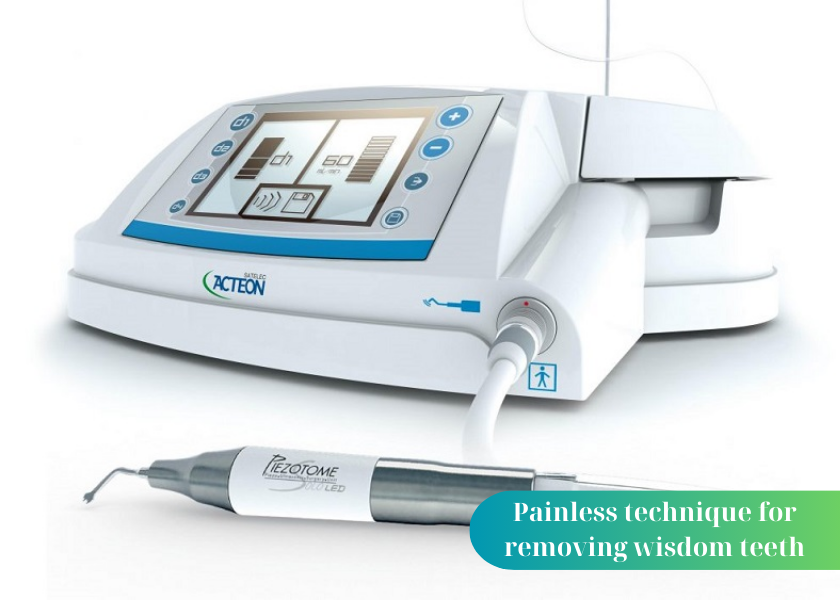
Currently, the Piezotome ultrasonic wisdom tooth extraction technique is one of the most popular, painless wisdom tooth extraction techniques today, applied by many dental facilities.
Piezotome ultrasonic wisdom tooth extraction is different from the traditional wisdom tooth extraction technique of using a knife to cut the gums and using leverage to extract the wisdom teeth. The technique of removing wisdom teeth using the Piezotome ultrasound machine relies on the impact of ultrasound waves to isolate the tooth root to separate the tissue and gums from the tooth root, thereby easily removing the tooth root from the gum tissue.
For misaligned or impacted wisdom teeth, this process usually lasts 15-30 minutes. You will not feel pain during the wisdom tooth extraction process. Another advantage of this method is its absolute safety. Wisdom tooth extraction using the Piezotome ultrasound machine hardly affects the nerves and blood vessels around the wisdom tooth extraction site and will not leave serious complications.
See more: Is dental implant painful? 9 things you should know to ease the pain
Some common symptoms after removing horizontal or crooked wisdom teeth and warning signs that you should see a dentist
Some common symptoms after wisdom tooth extraction are crooked, crooked teeth and warning signs that you should see a dentist. If these symptoms get worse, you should immediately contact the dentist who treated you!
Bleeding at the wisdom tooth extraction site: After wisdom tooth extraction, if the wisdom tooth grows horizontally, there will be bleeding at the extraction site. You should bite the gauze pad and change it as often as possible. You should not suck or spit blood more than once. Usually within 24 hours the bleeding will stop, but if you see a lot of bleeding and the gauze pad is spilled many times, contact your doctor immediately for timely examination and treatment.
- Numbness and loss of sensation in the tongue after removing crooked or horizontal wisdom teeth: During the surgery process, there will sometimes be manipulations that are too strong and will affect your nerves. During the first 1-2 hours after the anesthetic wears off, if you still feel numbness in your lower jaw and lower lip, don’t worry too much, after a few weeks these symptoms will disappear.
- If this symptom persists for 6 months, you may have nerve damage. To be safe, if these symptoms do not go away within 2 weeks, contact your doctor immediately.
- Pain at the site of the extracted tooth: After removing a crooked or horizontal wisdom tooth, you will feel the bone around the tooth forming sharp edges and poking into the gums, causing pain. If you encounter this situation, don’t worry too much but contact your doctor to have the sharp edge removed and smoothed!
- Infection after tooth extraction: You will experience this symptom if the dental instruments used for your surgery have not been sterilized or if you do not take proper care of your teeth after wisdom tooth extraction. Symptoms of dental infection are swelling and pain that lasts for many days. If the infection is accompanied by a fever above 38.5 degrees, your body is telling you to see a doctor.
Above is the information about wisdom teeth that are impacted, impacted, and 90 degrees horizontal that BeamDental wants to share with you. If you need to have your wisdom teeth extracted, immediately consult BeamDental’s service. We use Piezotome painless tooth extraction technology to give you an absolutely comfortable and secure experience.
Furthermore, with more than 10 years of experience in the dental service industry, we always create trust and reputation with customers. Please contact BeamDental immediately for detailed advice and quotes, we are happy to support and care for your smile.
The above article has helped you answer the question: “What are wisdom teeth?“. Contact Beamdental if you want advice on appropriate methods to have more precious information, we will provide free help 24/7.
See more: Are dental implants dangerous? 7 complications of dental implants
BEDENTAL - TOP STANDARD DENTISTRY SYSTEM
In HANOI
Address 1: 7B Thi Sach St, Ngo Thi Nham, Hai Ba Trung Dist, Ha Noi. - 0934.61.9090
Address 2: 343 Tay Son St, Nga Tu So Ward, Dong Da Dist, Ha Noi. (Nga Tu So Cross) - 0934.61.9090
Address 3: CC2 Tower Nguyen Huu Tho St, Dinh Cong Ward, Hoang Mai Dist, Ha Noi. (Inside True Hope ) - 0934.61.9090
In HO CHI MINH
Address 1: 53 -55 -57 Pho Duc Chinh St, Nguyen Thai Binh, Dist. 1, Ho Chi Minh. - 0766.00.8080
Address2: 25, City Land urban area, Go Vap Dist, Ho Chi Minh - 0766.00.8080
Working: 9am - 6pm everyday
Website: https://bedental.vn/en/

